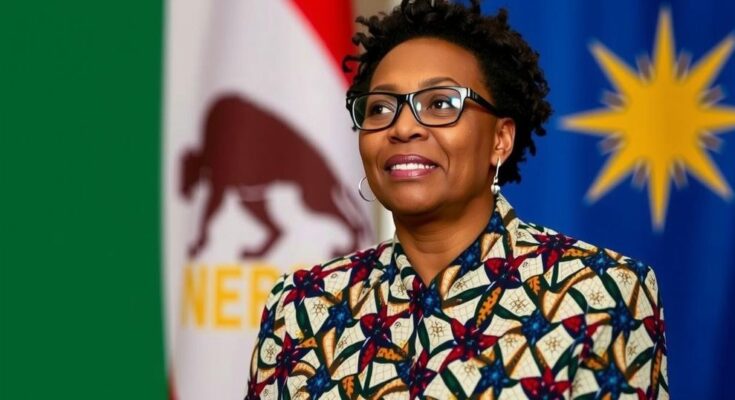Netumbo Nandi-Ndaitwah is poised to become Namibia’s first female president, having secured over 58% of the vote in the disputed election. Her nearest rival, Panduleni Itula, claims electoral malpractice and intends to challenge the results. Swapo, in power since independence in 1990, faces scrutiny amid regional political shifts. Nandi-Ndaitwah’s victory would position her alongside Tanzania’s only other female president, expanding female representation in the region.
Netumbo Nandi-Ndaitwah, a prominent member of the South West Africa People’s Organisation (Swapo), is on the verge of making history as Namibia’s first female president. Preliminary results from last week’s contentious election indicate that she has secured over 58% of the votes counted thus far, significantly ahead of her nearest opponent, Panduleni Itula, who has garnered just over 25%. Despite these figures, Itula’s party, the Independent Patriots for Change (IPC), has expressed intentions to contest the results, alleging electoral malpractice due to logistical issues during the election process. Swapo, which has maintained power since Namibia’s independence in 1990, faces scrutiny as other regional liberation parties have experienced electoral setbacks recently. Nandi-Ndaitwah, who has served the country in various governmental roles for 25 years, stands to join Tanzania’s Samia Suluhu Hassan as one of the few female leaders in Africa if victorious. Itula, a trained dentist, aims to challenge the results through legal avenues, indicating a contentious aftermath to the election. The electoral commission has emphasized that a candidate must secure over 50% of the vote to avoid a runoff election.
The Namibian elections are significant not only for the potential of electing the country’s first female president but also as a reflection of the ongoing political dynamics in southern Africa. The Swapo party, historically a liberation movement against apartheid South Africa, has been a dominant force in Namibian politics since 1990 but is now facing challenges that echo the experiences of other liberation parties in the region. Recent elections in South Africa and Botswana have shown a shift in political power, leaving Swapo to navigate growing dissent and electoral scrutiny. Nandi-Ndaitwah’s candidacy represents a milestone for gender representation in politics, and the outcome of this election could influence broader regional trends regarding leadership and governance.
In conclusion, as Namibia approaches a pivotal moment in its political history, the potential election of Netumbo Nandi-Ndaitwah as the first female president marks a significant advancement for female leadership in the nation. However, the contestation of the election results by the Independent Patriots for Change signifies a deeper underlying tension regarding electoral integrity. As the country witnesses evolving political dynamics, the implications of this election will resonate throughout the southern African region, possibly shaping future governance and electoral processes.
Original Source: www.bbc.com




